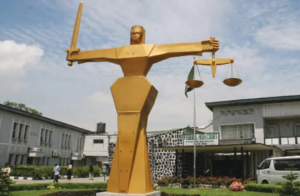
The Ekiti State Government has stated that the legal framework of the state does not recognize the existence of a Sharia Court or an Independent Sharia Arbitration Panel.
This clarification was issued by the state’s Commissioner for Justice and Attorney General, Dayo Apata, in response to reports of the first public sitting of the Ekiti State Sharia Panel, which recently settled two marriage disputes. The panel had claimed its objective was to provide arbitration based on Islamic jurisprudence.
Apata emphasized that existing judicial structures—including the Customary Court, Customary Court of Appeal, and High Court—have been effectively handling matters related to Islamic, Christian, and traditional marriages, as well as inheritance, without controversy.
“There is an existing legal structure in Ekiti State (i.e., Customary Court, Customary Court of Appeal, and High Court) that has been handling issues relating to Islamic, Christian, and traditional marriages and inheritance without any rancor or agitation,” Apata stated.
The Attorney General further warned against activities that could disrupt the state’s peaceful coexistence, stressing that the government would not tolerate any action that might incite hostility.
Apata also pointed out that arbitration and mediation fall under a quasi-judicial framework that is regulated by law. He clarified that in Northern Nigeria, Sharia Courts function similarly to Customary Courts in the South, with appeals from the former going to the Sharia Court of Appeal, while appeals from Customary Courts in Ekiti are heard by the Customary Court of Appeal.
He added, “Customary Courts and the Customary Court of Appeal can effectively handle any customary issues arising from Yoruba traditional marriages, Islamic marriages, and Christian marriages, especially those not backed by statutory law, which can only be dissolved by the state’s High Court.”
Apata also suggested that the timing of the Sharia Panel’s emergence could be linked to the approaching 2026 governorship election, alleging that opposition elements unable to criticize the government’s performance were resorting to unethical tactics.
He urged religious leaders to avoid being used for political gains, warning that the government would invoke the full weight of the law to uphold the Constitution and preserve peace in the state.








